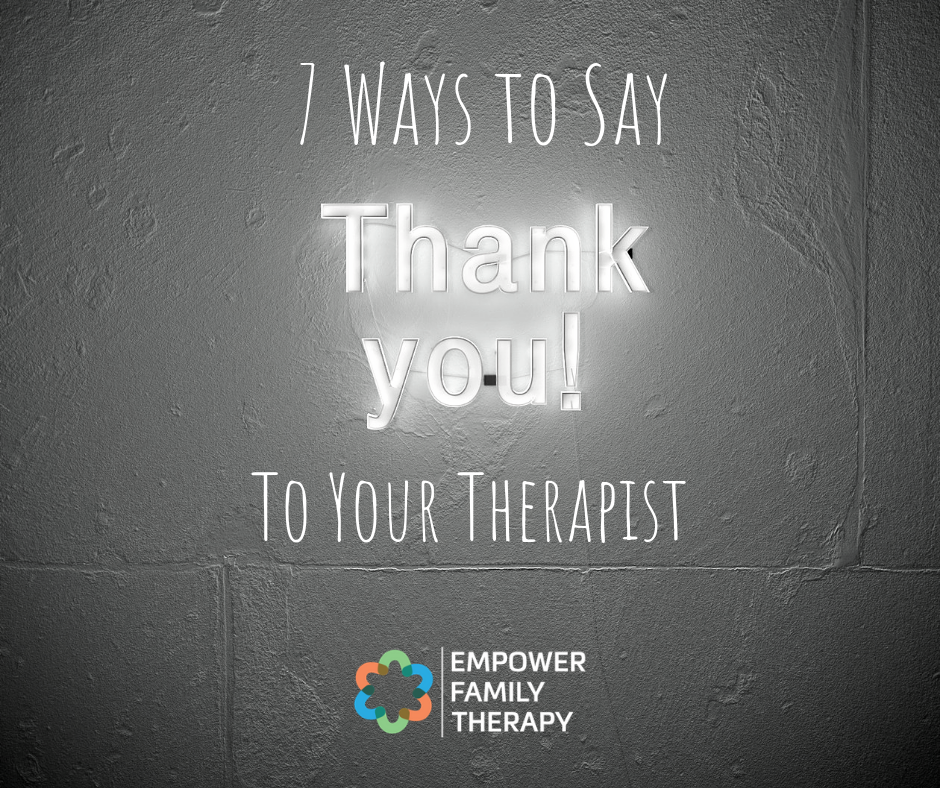7 Ways to Thank Your Therapist
Okay, so you may not love your therapist as much as Kristen Bell loves Jan Grey, PhD - but, if you are looking to show your therapist some love here are some ways that don’t include writing a song and producing a music video. And if you do love your therapist as much as Kristen does- even better! Not getting the reference? Here’s the link to get you up to date.
The therapist client relationship is undoubtedly one of the most complicated in terms of boundaries, and knowing what is appropriate and what’s not. This leads to a lot of question marks for both clients and therapists. If you’ve felt unsure once or twice about whether something is ‘appropriate’ in your therapeutic relationship- you’re not alone!
Therapists abide by strict (yet vague) rules from their ethics boards on what is allowed in the therapeutic relationship- but, these rules have large gray areas. For example, therapists are encouraged to not accept gifts from their clients: now it may seem obvious that a brand new car or Rolex is an inappropriate gift to accept from a client- but, what about a handmade gift from a child or flowers on the day of the final session?
It is tough for both therapist and client to know how to appropriately tow the line of these vague rules, and the unfortunate answer falls on the unsatisfying ‘case by case,’ answer. But, it leaves many clients stumped on how to express their gratitude to the person who has played a vital role in their lives.
Looking for some ways to express your gratitude to your therapist in a way they’ll surely appreciate?
7 ways to thank your therapist:
1. Tell a Friend
Therapists love when someone contacts them and shares they were referred by a friend, family member, or neighbor who had a great experience. Just like with any business, the best referrals are word of mouth from satisfied clients. Starting therapy is scary, and if you know someone close to you has seen success in working with this therapist, it goes a very long way. Some people feel uncomfortable sharing that they are in therapy, and this may not be the best fit for those. But, why you were seeing a therapist is much less important than the experience you had. So leave out the details, and focus on the takeaway.
2. Write a Note
It can be difficult for both the therapist and the client to fully explore all that the therapeutic relationship and process has meant in a final session. Most often things are forgotten and unsaid. Writing notes and journaling is an intervention therapists offer frequently, and is a great way for clients to express what the therapeutic journey has meant to them. It also eliminates the pressure of expressing these often difficult reflections face-to-face. The logistics are not relevant- despite whether the note is one sentence or three pages, handwritten or typed, in an envelope or an email- the sentiment will be appreciated. Receiving a note like this will for sure give your therapist the warm and fuzzies.
3. Do the Feedback Survey
It seems that nowadays you can’t go or do anything without being hounded after the fact for feedback on your experience. And it is an unfortunate phenomenon that businesses (therapists too) only get the occasional negative feedback, rather than the positive. I am very guilty of only filling these surveys out when my experience was unsatisfying, and ignoring them when my experience was satisfactory. Occasionally therapists will send clients a feedback survey after their first session or when they discharge/transition. This provides the therapist with meaningful feedback on things that are working and not working in their practice, and allows clients to share experiences they may have not found the opportunity or courage to share in session. These surveys often include a space to specify if you’re willing to have your statements shared to potential new clients, or if you’d like your therapist to keep your feedback confidential. If you have questions about how your answers will be used- reach out and ask before you skip out on the survey all together.
4. Send an Occasional Update
It is common for clients to wonder if their therapist thinks about them between sessions, and after they terminate. The answer is ‘yes’ we do, occasionally, think about our clients in our ‘off time’ and after they leave us. It is the job of a therapist to help clients reach their goals and go back into the world to be successful and happy. Sending a quick update via email or snail mail can be a nice way to update your therapist on all the good stuff you’ve been up to since you saw them last. The key to this is to not expect a response. I once had colleague who happily received a wedding invitation from a past client, who had done significant work to overcome difficulties in their romantic relationship. Yet the meaningfulness of the invite was less about questioning the ethics of whether to attend the wedding, and more about celebrating the ongoing successes their previous client was continuing to make on their own.
5. Share in a Local Facebook Group
I cannot praise the local mom/s Facebook groups I am a part of enough. Those women know everything from whose chicken is on the loose, to whether your kid’s random rash is serious enough for a doctor’s visit vs. a home remedy. Without a doubt they are the hive mind that keeps our community businesses afloat. And you better believe they trust each other when it comes to things like therapist referrals. In my experience, the unspoken sense of confidentiality is higher in these groups than in other online communities, and may seem like a safer place for a client concerned about sharing their experiences in therapy. Also, If I could buy every mom in the Oak Park Working Moms Facebook group a cupcake or a glass of wine I would - those women are a personal and professional godsend.
6. Give Stars
It may not be a surprise that your local therapist practice doesn’t have a sticker in the window that says “People Love us on Yelp!” Therapists have a difficult time getting a lot of ‘stars’, mainly due to the confidentiality of their work and the stigma their clients may feel, despite how satisfied they may be. But, just like any business from a dentist to an ice cream store- consumers love 5 Star Ratings. It may seem contradictory that people seeking counseling support are consumers, but they are. Oak Park and River Forest, as well as the Chicagoland area, are saturated with therapists; and it is ‘the little things’ like a few good reviews on various search engines that make a therapist stand out to potential clients. This strategy may be a better fit for those that have less concerns about having their name associated with a review on a website, since few allow anonymous posts. But once again, the post you leave doesn’t have to say anything about what brought you to therapy, it can be focused on non-clinical things like the speed of response to initial email, the ease of scheduling, or the comfort and style of the office.
7. Just Ask
The final suggestion may seem obvious, but is the least utilized. Simply ask your therapist directly how you can best share the experiences you’ve had. Therapists have specific rules regarding soliciting reviews, and confidentiality/anonymity make it difficult for therapists to gather feedback. Due to these complicated hoops and gray areas, many therapists choose not to bother with requesting feedback, and instead rely on word of mouth to build their business. Regardless of your therapist’s action plan, I guarantee they will gladly offer some methods and places you can share your thoughts and experiences in a way that feels comfortable to you. And even if they don’t share your feedback with anyone else, I guarantee it will get the point across that you appreciate them.
The strange concept of providing feedback and reviews for your therapist goes hand-in-hand with the stigma associated with seeking support for mental health and relational needs. I realize this may not be a comfortable way of expressing gratitude for many. I also have experienced the Oak Park and River Forest communities to be surprisingly open and supportive of mental health- just another one of many reasons why I am proud to be a local resident and therapist.





